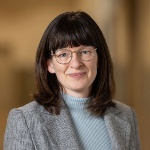Brazil, France, Great Britain, India, Canada, the Netherlands, South Africa, the Czech Republic and the USA: 18 top-class international young scientists visited the University of Stuttgart on July 8 to find out about milestones in quantum research at the Center for Integrated Quantum Science and Technology (IQST). The visit was organized by Baden-Württemberg International as a follow-up program to the 73rd Lindau Nobel Prize Meeting.
Once a year, Nobel Prize winners and a select group of young researchers from around the globe convene in Lindau. An invitation to the conference is a prestigious recognition among young researchers, reserved exclusively for the world's most promising talents. This year's Lindau Nobel Prize Meeting, which took place from June 30 to July 5, focused on physics. The delegation members, who visited the University of Stuttgart and IQST on July 8, came primarily from the fields of physics and quantum research.
An impressive network for the Quantum Revolution
"What sets us apart: IQST is not only home to physicists, but also to chemists, engineers, natural scientists, doctors and experts from a whole range of other disciplines. Together, we are delving into revolutionary, interdisciplinary areas of research," remarked Prof. Stefanie Barz in her welcoming address. The professor at the University of Stuttgart’s Institute for Functional Matter and Quantum Technologies heads the IQST together with Prof. Fedor Jelezko from the University of Ulm.
Barz gave the guests an insight into quantum research at the University of Stuttgart and introduced the IQST. The University of Stuttgart, with its strong focus on quantum technology, spans a broad spectrum of fundamental research, all the way to the development of cutting-edge applications through generously funded, international, cooperation projects. At IQST, the University of Stuttgart conducts basic research together with the University of Ulm and the Max Planck Institute for Solid State Research as well as numerous other industrial partners. IQST develops pioneering applications - from quantum computers and quantum sensors to quantum communication - and is also home to the office of the state initiative QuantumBW, which bundles research activities and initiatives in Baden-Württemberg.
"The University of Stuttgart and the IQST network offer many exciting opportunities for young scientists in the field of quantum research," says Barz. A total of 125 doctoral students are currently conducting research on 80 IQST projects.
We quantum: Fascinating insights into pioneering research
“The IQST slogan is We quantum. We deliberately use quantum as a verb: We do something, we move things forward," says Barz. Following the welcome address, the delegation members had the opportunity to experience cutting-edge research up close during three laboratory tours, and to look over the shoulders of young researchers from Stuttgart.
The researchers from the "Wrachtrup Group" provided insights into the research field of quantum communication. The group's work is intended to lay the foundations for quantum communication applications over long distances. The group is led by Prof. Jörg Wrachtrup from the 3rd Institute of Physics at the University of Stuttgart.
How many atoms do we need to store data and transmit information? Young researchers from the Loth Group showed the guests experiments in which the physical limits of circuit miniaturization were tested using state-of-the-art scanning tunnelling microscopy. The Loth Group is headed by Prof. Sebastian Loth from the Institute for Functional Matter and Quantum Technologies.
Prof. Stefanie Barz also opened the door to her laboratories. She heads the "Integrated Quantum Optics" group at the Institute for Functional Matter and Quantum Technologies at the University of Stuttgart. The emphasis lies on quantum states of light, a cornerstone of research crucial for advancing quantum technologies.
A guest in one of the most modern research buildings for quantum applications
During the guided tours of the laboratories, there were lively discussions and many interested questions. The guests were also impressed by the pioneering research infrastructure in Stuttgart: The ZAQuant Center for Applied Quantum Technology, which opened in 2021, offers excellently equipped laboratories for research into quantum sensor materials and for precision measurements on quantum sensors. At the heart of the research building are four high-precision measuring boxes. Clean rooms, laser laboratories, physical, chemical and biochemical laboratories, offices and communication areas are also integrated.
Following their visit to Stuttgart, the group will proceed to Ulm, with additional stops planned throughout Baden-Württemberg. The delegation will be exploring Europe's foremost innovation hub until Friday, July 12th.
Contact

Lena Jauernig
Editor Research / Early Career Researchers






